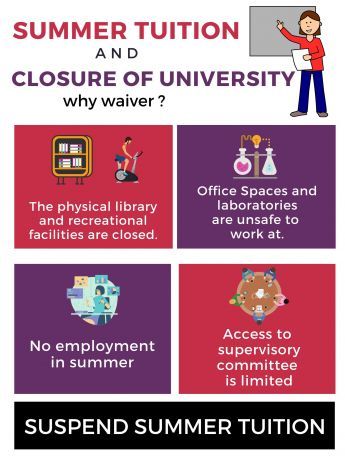Action Alert
You are here
Suspend summer tuition!

April 3, 2020
In response to the Covid-19 pandemic, universities across Canada have announced an indefinite closure of their on-site services and have shifted most operations, including courses, online. Most undergraduate students, except international students on study permits, have vacated their student residences and will now receive the remainder of their course instructions online. While these measures were necessary in the interest of public health, they have pushed graduate students to a more precarious position and in need of immediate financial support. Despite the closure of crucial on-site services – such as the physical libraries, laboratories and office spaces, and the inaccessibility of academic support from supervisory committees, universities still maintain that graduate students must pay summer tuition over what will be an incredibly stressful and precarious few months.
But now, graduate students in universities across Ontario have launched concurrent campaigns - and are writing to their administrations demanding a suspension of summer tuition. These campaigns, headed by graduate unions at Carleton, Queen’s, Western and York, have received great support among the graduate student communities and have succeeded in bringing their popular voice to the table.
What summer tuition means for students, and what it means for the university
The annual revenues of public universities are drawn from various sources – student tuition, provincial operating grants, federal grants and investment income. Of these sources, student tuition makes up between 55% to 65% of the total revenue. But this is largely drawn from undergraduate tuition, especially the high rates paid by international students. Summer tuition paid by graduate students is a meagre 1-2% of the university’s annual revenue. In the wake of the Covid-19 crisis, the operational expenses of the university for the summer term are likely to be reduced drastically (owing to the shift of operations online, and the subsequent layoffs of workers, especially in hospitality and maintenance sectors), rendering graduate summer tuition to be an entirely dispensable drop in the ocean of annual revenue.
For graduate students though, summer tuition is an incredibly overwhelming burden, more so now than ever. In the absence of employment opportunities both on and off campus this summer, and in the wake of the disruption of their research timelines with the closure of university services, they will struggle to pay rent, place food on the table and support their dependants or spouses. One graduate student at Queen’s describes this precarity clearly - “If we pay summer tuition, an average domestic graduate student would be left with virtually nothing to survive on, after paying rent. Our international colleagues struggle even more, given the tuition disparity. It is cruel to demand tuition from us in this unprecedented crisis, and to push us further into indebtedness.”
This financial stress is all the more exacerbated by the fact that research timelines have been disrupted by travel restrictions and closures to laboratory services, rendering upper year graduate students worried about timely completion of their degrees.
Suspension of summer tuition is not only financially viable; it is the only responsible decision to make.
Graduate unions fight back across the province.
In light of these unjust expectations placed on graduate students, graduate worker unions have stepped up to demand a full suspension of summer tuition. Across the province, they have launched letter campaigns to their respective administrations, with an incredible popular support from graduate members. Within hours of launching the campaign, hundreds of graduate students signed up to make their voices heard. Although presently limited to 4 universities, it is likely that graduate students at more universities will join efforts and transform these local campaigns into a province-wide demand. Summer tuition is normally due in May, and as the pressure upon university administrations continues to build up, the response will demonstrate whether or not their verbal commitments to supporting graduate students through the crisis is just a hollow gesture.
The way forward.
In this period of crisis, it would be shameful if universities continue to insist on extracting profits from precarious academic workers. It is true that universities will have to transform their fiscal and pedagogical models in the coming months, but the cost of this shift cannot be borne by the already precarious strata of the education sector. As universities refuse to shift their priorities even in the midst of a pandemic, they have begun to further expose that their commitments lie in generating profits at the expense of researchers, rather than knowledge production and student welfare itself.
As this crisis deepens, it is likely that contract employees, adjunct faculties, food workers, library staff, cleaning workers will come under attack, so as to maintain status quo. In the campaign for summer tuition, graduate students are beginning to set the precedent for a grass-roots pushback against austerity. The amplified interests of investors and stakeholders in the sector might push administrations to attempt to conserve the status quo at the expense of our well-being, but an organized fightback from below is sure to determine what the university will look like after the pandemic. The university is us.
Section:










